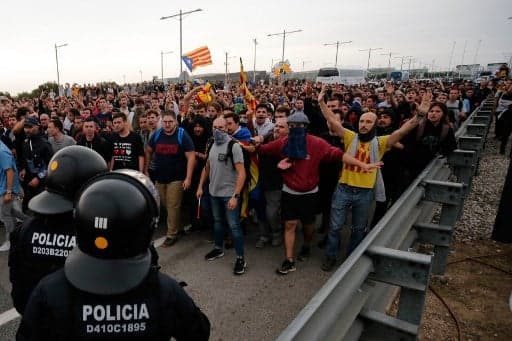Catalan separatists slammed over 'totalitarian' attitude

Spain's Catalan foreign minister on Tuesday accused separatists of acting in a "totalitarian" way by excluding those in the region who were not in favour of breaking away from Spain.
"The root of the problem is that the independence movement is ignoring the Catalan identity of those who are not pro-secession," Josep Borrell, the European Union's incoming foreign policy chief, told journalists in Madrid.
"When you exclude one part, it becomes a totalitarian act."
Borrell was speaking a day after Spain's Supreme Court sentenced nine separatist leaders from Catalonia to between nine and 13 years in prison for sedition over their role in a failed independence bid.
The ruling triggered protests across the wealthy northeastern region that sometimes turned violent.
WATCH: Police clash with protesters at Barcelona's El Prat airport
The head of Catalonia's separatist regional government, Quim Torra, said the verdict showed "contempt for Catalan society" which "will know how to respond to this ingominy in the way that it always has, with determination and firmness."
But Borrell said not all Catalans felt the same way about the verdict.
"When I hear people say that the Catalan people think like Torra does, my reaction is: hey, I'm Catalan and I don't think like you. You cannot say all Catalans think like me," he said.
"To repeat over and over that the Catalans feel affected by the sentence - well, no."
Polls show Catalonia, which is home to some 7.5 million people and accounts for about one fifth of the Spanish economy, is divided on the issue of independence.
A survey released in July by the Catalan's government's own polling firm showed 48.3 percent of Catalans oppose secession while 44 percent are in favour.
Catalan separatists on Tuesday blocked streets and train tracks in protest against Spain's jailing of nine of their leaders, a day after activists stormed Barcelona airport in an angry response to the verdict.
Pro-independence groups called for demonstrators to hold sit-ins from 7 pm (1700 GMT) outside of Spanish government offices in Barcelona and other Catalan cities as part of Tuesday's protests.
Nova mobilització de rebuig a la sentència! Fem sentir la nostra veu, pacífica i determinada ?
‼Segudes pacífiques
? Avui, 15-O
⏰ a les 20 h
? Davant l'Agència Tributària de Mataró
? Porta la teva espelma!#EnsCondemnenATots pic.twitter.com/wQIL58oL4C
— Òmnium Maresme (@omniummaresme) October 15, 2019
Several roads were cut across the northeastern region, including the AP-7 which links Barcelona to France near the separatist stronghold of Girona, local officials said.
Demonstrators also blocked train tracks with burning tyres and other debris as they awaited new instructions from Democratic Tsunami, the group which coordinated Monday's mass bid to swarm the city's El Prat airport, where they choked-off road and rail access.
In the coming days, protesters are planning to stage marches from five Catalan towns towards Barcelona where they will gather on Friday, when unions have called a general strike. Students are also planning to rally in Madrid on Wednesday.
READ MORE:
Comments
See Also
"The root of the problem is that the independence movement is ignoring the Catalan identity of those who are not pro-secession," Josep Borrell, the European Union's incoming foreign policy chief, told journalists in Madrid.
"When you exclude one part, it becomes a totalitarian act."
Borrell was speaking a day after Spain's Supreme Court sentenced nine separatist leaders from Catalonia to between nine and 13 years in prison for sedition over their role in a failed independence bid.
The ruling triggered protests across the wealthy northeastern region that sometimes turned violent.
WATCH: Police clash with protesters at Barcelona's El Prat airport
The head of Catalonia's separatist regional government, Quim Torra, said the verdict showed "contempt for Catalan society" which "will know how to respond to this ingominy in the way that it always has, with determination and firmness."
But Borrell said not all Catalans felt the same way about the verdict.
"When I hear people say that the Catalan people think like Torra does, my reaction is: hey, I'm Catalan and I don't think like you. You cannot say all Catalans think like me," he said.
"To repeat over and over that the Catalans feel affected by the sentence - well, no."
Polls show Catalonia, which is home to some 7.5 million people and accounts for about one fifth of the Spanish economy, is divided on the issue of independence.
A survey released in July by the Catalan's government's own polling firm showed 48.3 percent of Catalans oppose secession while 44 percent are in favour.
Catalan separatists on Tuesday blocked streets and train tracks in protest against Spain's jailing of nine of their leaders, a day after activists stormed Barcelona airport in an angry response to the verdict.
Pro-independence groups called for demonstrators to hold sit-ins from 7 pm (1700 GMT) outside of Spanish government offices in Barcelona and other Catalan cities as part of Tuesday's protests.
Nova mobilització de rebuig a la sentència! Fem sentir la nostra veu, pacífica i determinada ?
— Òmnium Maresme (@omniummaresme) October 15, 2019
‼Segudes pacífiques
? Avui, 15-O
⏰ a les 20 h
? Davant l'Agència Tributària de Mataró
? Porta la teva espelma!#EnsCondemnenATots pic.twitter.com/wQIL58oL4C
Several roads were cut across the northeastern region, including the AP-7 which links Barcelona to France near the separatist stronghold of Girona, local officials said.
Demonstrators also blocked train tracks with burning tyres and other debris as they awaited new instructions from Democratic Tsunami, the group which coordinated Monday's mass bid to swarm the city's El Prat airport, where they choked-off road and rail access.
Join the conversation in our comments section below. Share your own views and experience and if you have a question or suggestion for our journalists then email us at [email protected].
Please keep comments civil, constructive and on topic – and make sure to read our terms of use before getting involved.
Please log in here to leave a comment.